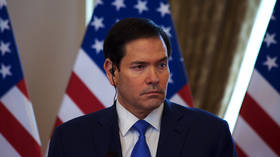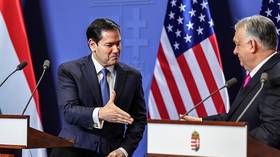US involvement in Ukraine is like ‘Russia getting involved in Puerto Rico’
Though Republicans hold a majority of seats in the House of Representatives and Democrats hold a majority of seats in the Senate, a majority of Americans say that neither party represents them.
According to a new national survey by Rasmussen, 53 percent of likely US voters think that neither political party truly represents the American people. The poll shows that the two-party system is losing ground with Americans – six months ago, in October, only 46 percent of questioned voters said that neither party represents Americans.
RT’s Lindsay France spoke with 2012 Libertarian Party presidential candidate Gary Johnson about Americans’ lack of representation in the halls of political power.
RT: Now let’s talk about this lack of representation. Seventy-two percent say it would be better if the country didn’t elect the incumbents to Congress this year in November. If they don’t trust either party, the incumbents or the new guys, what’s the alternative?
Gary Johnson: Well, first of all, I agree with the poll. I think this is what we’re all witnessing. I think term limits would really be a silver bullet, the notion that people would get in, do the right thing and get out. And then, Lindsay, you know, a couple of issues of late that really left all the politicians behind: the marriage equality, nobody was standing up for that; the marijuana legalization, the state of Washington, the state of Colorado moving ahead of all politicians; and then if you look at Libya and Syria, the president’s ready to go in militarily, Congress is ready to dot the i’s and cross the t’s on how to do that and, lo and behold, 80 percent of Americans don’t want to do that. Well that’s a good thing. I just wish that Congress would catch up to the fact that this spending is not sustainable and, if they don’t fix this, we’re going to find ourselves in a monetary crisis. We’re going to find ourselves without a country.
RT: Well, let’s talk about government trust among young voters, those between the ages of about 18 and 29. A new poll surveying young Americans’ political attitudes released by Harvard University’s Institute of Politics [on] Tuesday, found that the millennials’ 'composite trust index,' it’s called, which is the level of trust, on average, in six different public institutions: the presidency, the US military, the Supreme Court, the federal government, and the United Nations, it’s dropped dramatically in just two years...from 39 two years ago down to 31 in mid-April...How do politicians come back from this sort of a drop? We’re talking about the young generation, the young voters here.
GJ: Lindsay, I know you have statistics there on young voters, but I believe that it isn’t just young voters. I think that they are the canary, though, in the coal mine, and that, if politicians don’t get in touch with this, that, really, we’re going to find ourselves...I do already think we’re in a catastrophe of sorts in that we’re not being represented. Of course, having run for the Libertarian nomination for president, I can tell you that whether you’re a Libertarian, whether you’re a Democrat, whether you’re a Republican, you have baggage whether you have that baggage or not. We’re suing the Presidential Debates Commission right now to say if mathematically you are a party that can conceivably be elected president of the United States with enough electoral votes, then shouldn’t you be included in the debates? Just give another voice out there, and the more voices we have with input on where this country should go, I suggest we’ll all be a lot better off. But it is a two-party system, and it’s very exclusionary. I found that out face-to-face. It’s not a good thing. More voices, the better. And I’m not being hypocritical here. As governor of New Mexico, I made it as easy as, I signed legislation making it as easy as possible for third parties to be able to run.
RT: Well, let’s talk about these other voices. You know, even after the midterm elections, President Obama’s got a while left in the White House. He’s facing very low approval ratings right now – extremely low, embarrassingly low. What does this midterm election look like? Can it change things? Will new voices, depending on who makes it in through the midterm elections, change his approval ratings? Will they be able to steer him away from some of those bad decisions?
GJ: Well, I don’t place blame on Obama, I do place blame on the system that is very status quo oriented, that more than anything politicians are concerned with getting reelected, as opposed to doing the right thing...When people don’t vote, it’s a, you know, that’s not a good thing. And maybe we’ll see some huge voter turnout. I have no optimism whatsoever that anything changes in Washington as a result of these midterm elections. Look, I think that the president should be a leader and that he should be controversial and that he should press the things that he wants to do. And Republicans, they should be leading on the issues that they should be strong on, and that would be spending and that would be the deficit. And then both parties, they ought to come together on issues that everybody cares about. I think the majority of Americans – speaking with a broad brushstroke – are fiscally responsible and socially liberal. I always tell people I’m as conservative a politician as you’ve ever met when it comes to dollars and cents, and I’m a flaming liberal when it comes to civil liberties. The militarization of our police forces, this is happening under the guise of both political parties watching this. I mean, it’s getting so bad. One-hundred-and-ten million Verizon users are being monitored by the NSA. This is happening under the eyes of both political parties. There just doesn’t seem to be any hope out there.
RT: Well, let’s talk about our foreign involvements, which most people will say have been numerous lately. As the saying goes, “Go big or go home.” Well, we’ve gone big, and now it appears it’s time to go home. According to nearly half of the respondents from an NBC/Wall Street Journal poll, 47 percent of them say the US should become less active in world affairs. Now if you look at what’s going on: US involvement in Ukraine, the Iraq debacle, troop withdrawal from Afghanistan, trying to go into Syria, Libya before that, what is the way forward for those who want votes this election season, with all of the concern Americans feel on these issues?
GJ: Well, the way politicians address this of course is to get tough, drop bombs. I mean, Republicans are all about who’s going to drop the first bomb? What about the notion of free trade? Gosh, is China really an enemy when they’re, you know, our second biggest trading partner? I don’t think so! We should be looking at trade with other countries first and foremost...You don’t go to war against trading partners. But yet we’re always talking about sanctions, and sanctions just don’t work. And when you look at Ukraine right now, I think that would be analogous to Russia getting involved in Puerto Rico. They’re not going to do it. We shouldn’t get involved in Ukraine. There are unintended consequences as a result of our military interventions. I’m going to suggest that we have hundreds of millions of enemies to this country because of our military interventions.
RT: Well, let’s talk about Ukraine for a minute. Obviously it’s a hot spot in world topics...How should the US approach the crisis in Ukraine? Should the US do more or less?
GJ: Well, less! Look, don’t get involved in Ukraine! It would be like Russia getting involved in the affairs of Puerto Rico. They’re not going to do it! We shouldn’t be involved in Ukraine! There’s no national security interest here at stake. And I know you’ll hear politicians beating their chests, arguing the opposite. Well, I’m going to argue that there is no national security interest here at risk, and the government has an obligation to protect us against foreign governments that might do us harm – this is not one of those situations.














